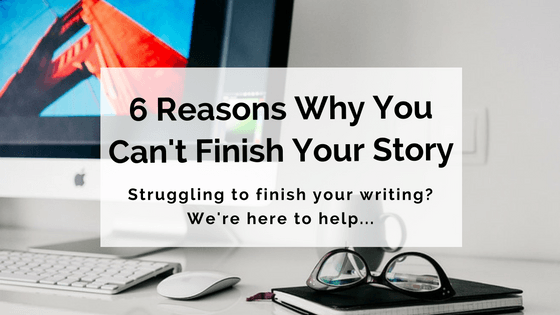Every writer will have a certain project that is seemingly impossible to finish, no matter how hard you try. After all the hard work, all the hours creating intricate plots, well-rounded characters and detailed settings, sometimes your writing just comes to a stop, and you’re left amidst those final chapters thinking: what do I do now?
Those final moments are going to be the ones to piece everything together, to finalise your work. A lot of the time that pressure can get to writers, which tends to mean that the ending goes ignored.
No matter how you avoid it, your struggle with finishing a project all comes down to a key reason. Whether it be your dissatisfaction with your writing or your difficulty deciding where and how your story should end, don’t worry: there are ways to get past it and finish the job.

For all those struggling to reach the end of their story’s journey, let’s take a look at six common reasons why you might be stuck, and ways you can overcome those obstacles.
1. You don’t know how to end your story.
It’s a pretty obvious reason: you can’t actually finish writing your story because you have no actual idea how it should end.
No matter how you look at it, writing is an inherently unpredictable craft; new paths and unexpected changes are a guarantee, and each writer needs to learn to both accept and tackle this. While some writers choose to map out every plot point before starting, many others prefer to write with what feels right and work on a story freely.
So whether you’re a plotter or a pantser, how can you come up with the perfect way to end your story?
If you haven’t planned out your entire story, list a handful of potential endings and work with each one. Try writing each hypothetical ending down and pick your favourite.
If you’re on the other side and find your usual planning has come to a stop, perhaps it’s time to start working with stream of consciousness.
Give yourself the freedom to write down whatever you can think of and work with it instead of limiting what you do. Practice and experiment with various brainstorming methods.

Let’s take a look at a few techniques that might come in handy.
Create a mind map
This is a fairly common approach, but it can still work wonders. At the centre, write your aim and expand from there with different ideas or potential ending. With every sub-category, there can be endless amounts of branching out.
This method forces yourself to think about vague ideas and elaborate in the most intricate, sometimes irrelevant details, and works great for those completely lost, letting the mind go wherever it pleases.
Remember: don’t limit yourself; no option is too ridiculous or out-there when brainstorming.
Transport yourself
Try to imagine how your story would work in a different time period, a different reality, or even just a different location. Better yet, imagine how you would approach this writer’s block in a different time.
Possibilities become near endless when you imagine a new world. Whether your story is fantasy/sci-fi or not, a world with no limits of time and space creates all new inspiration for you.
This technique works best for those with fairly sound characters in their story, but who are unsure about plot progress. If your character has built a mind of their own, the question of ‘what would they do?’ becomes easy, and a new idea can branch out.
Creating a hypothetical world gives you more freedom to conceptualise anything, and these ideas could end up being starting points to the final chapter.
Challenge yourself
Make a list of what you know about what you’ve written so far and challenge it. Why does each point you have made need to be the case? So you’ve made a villain for your protagonist. Why has he come about this way? Did he have to become a villain? Why does he have something against your protagonist?
It’s all about asking difficult questions that make you think. Imagine yourself antagonising your other self; try to be a harsh critic and question your work.
You’re making yourself justify the story’s actions, and doing this will help you discover what the most crucial points are and which questions you need to answer. Your ending then becomes clearer after you’ve ruled out the necessary points.
Reverse your thinking
Say your goal is that the main character retrieves a certain object at the end of the story. Ask yourself the opposite. How can you stop them from reaching this goal? Experimenting with obstacles helps your come up with a much clearer path into achieving that final point.
This works great for people with a vague idea of how they want to end their story, but are not entirely sure how to get there. Asking yourself how to not get there leaves you with an almost adventure-style quest for your plot, forcing it to break through obstacles to reach the ending.
For all these methods, the most important thing to do is to remember your intentions to finish the text. Let the freedom of your brainstorming methods unravel all new ideas for your conclusion, and then allow yourself to settle into a natural conclusion.

2. You’re trying to end your story too early
Are you searching for an ending that’s premature? Look through your work again. Does it fulfil its complete potential as a story?
If you’re avoiding that ending you want so much, it might be because the story isn’t ready to end.
Re-read your work and see what’s missing. Explore your work with a detailed eye and source out any points you don’t like anymore, or any problems you never ended up concluding.
Once you’ve read through your work once more, ask yourself:
- Have I created complicated and developed enough characters?
- Can I read my story and objectively comprehend what is happening?
- Have I left any loose ends or left particular points unresolved?
- Finally, is the story truly ready to end?
When you feel you’ve answered those questions, and any others you think you may need, it will help you finally see an ending clearly. Your mind won’t be clogged with other thoughts and questions about your work, and you’ll be free to focus purely on how to conclude your story.
Remember, there’s no use rushing through a work just because you want it done. The extra time and effort could turn an average piece into a great one.

3. You need feedback
You might be having doubts about your work that you can’t fix on your own. So perhaps it’s time you got advice from a peer.
Find someone you trust and show them what you’ve got, ask questions and get some valuable feedback. They may pick up on something you hadn’t considered before, which could help you on your way to a sound ending.
There are many compelling reasons to share your writing, and the feedback you’ll receive may just help you devise that perfect ending.
If you’re feeling shy about sharing with friends and family members, don’t worry! There are plenty of other ways to get feedback and editing help on your work without the worry of judgement from people in your personal life.
Attend a writer’s workshop
Workshops can be found almost everywhere. Whether they be amateur local groups, university communities or even professional businesses with offices and centres in main cities, there are always communities around you with help for writers.
Writer’s workshops give you the opportunity to freely show your work in an unofficial environment where you can communicate immediate thoughts and ideas with one another. It provides an opportunity to discuss face to face with other writers what they like about your story, what they don’t like about it, and any questions they may have.
Discussing your motivation and intentions with your work in an informal conversation is less intimidating, but still just as helpful as any other method. You can work together as a group to brainstorm ideas about your stories. You will get constructive feedback from fellow writers, while also allowing you to give some back in return.
Attending a writer’s group or workshop also gives you an opportunity to socialise with other fellow writers in your areas.
Discover a beta reader
A beta reader’s purpose is to read and critique a person’s work before it’s ready for submitting or publishing. They usually come in long before an editor or publisher is involved.
If you are looking for more private help in your work, a beta reader could be a great choice. They give all kinds of feedback and advice, and cater to your specific needs. Finding them online is very easy and could be the way to go if you’re really stuck for ideas.
Just like workshops, beta readers will be able to give you helpful feedback, as well as editing tips. The difference will be that, as it’s usually their job, they will have more time to give you lengthy advice, and give you a more personal and one-on-one interaction.
This could be the way to go if you feel you may need a little longer than an hour or two’s discussion on your work, especially if you feel really stuck on that ending. It also helps if you’re lacking motivation, as a beta reader can assign deadlines for work, and technically ‘force’ you to actually get it done.
Explore writer’s forums
If a beta reader isn’t your style, and you’re hoping to go a little more anonymous, an online forum could be the way to go. Forums work great for people needing that little bit of motivation and feedback, without putting any pressure on you for deadlines or upkeep as other methods can do.
Forums tend to give you a lot more constructive criticism over positive feedback. As with most things online, members will feel more open and confident in giving criticism where it’s needed, which, for some, can seem a little upsetting, but for others is just what they need. A forum is the perfect option if you’re looking for honest, helpful and impartial advice for your work.
There are plenty of websites that have a very active writing community. Try the Australian Writer’s Forum or Scribophile for a start.

4. You’re not writing for yourself
One of the most common pieces of advice for writers is not to write for trends. There are many reasons why you should write for yourself, not the market – the most important of which being that writing for a market can tend to create disingenuous work, both for yourself and the reader.
It’s possible you’re being overly influenced by what is trending and what your friends and the media are into at the present. Maybe you’re adding narrative elements that seem to be popular today but don’t necessarily work with your style of writing.
This can lead to your mind looking for an ending that doesn’t necessarily fit with your starting vision. That ‘trendy’ ending you’re searching for is becoming difficult to grasp at because it’s not in the style your story needs.
Just like anything else, story fads don’t last, and you need to remind yourself that a valuable work is going to surpass market trends.
Look back at what you’re writing and ask yourself if it’s written for you. Do you find it compelling and does it work with the story you had envisioned? Are you writing a story you yourself enjoy?
If you don’t think you are, then maybe it’s time you took a step back.
You shouldn’t be compromising your writing for fads and trends, so keep to the integrity of your original work. If it seems to follow a trend, but you’re happy with it, then stick with it. But always make sure you aren’t adding in unnatural aspects that don’t really follow what makes your writing yours.
Once you start to feel like your ideas are genuine to your writing style, you should then be able to clearly envision your perfect ending.
A pretty sound method is to try excluding yourself from any external influence while you are working on your story, at least until you’re back on track.

5. You’re not giving yourself enough time
It’s frustrating being stuck staring at an unfinished page or chapter. Sometimes it’s so frustrating you end up losing interest and giving up. This can, unfortunately, start to become an unenjoyable cycle of try and fail, and you can soon end up resenting the entire writing process.
Losing that motivation and commitment will only make it harder to conjure up an ending, leaving that story a lost and unfinished creation for good.
The best option here is to try forcing yourself to work on your project. Whether it be ten minutes or two hours, set a timer and stick with that time. Allocate free time every day or every week and stick to it no matter what. No procrastinating or distracting tabs opened up; just you and the page.
Let yourself free-verse or experiment with stream of consciousness. Allow extravagant brainstorming and simply make yourself write. Encourage and motivate yourself to create something, no matter how small, and let that become the roots of an exciting new ending.
Just like the rest of your body, your brain needs time to warm up, and you might just discover, after a few hours of forced activity, a pretty great idea for an ending – one you may not have been able to think up among the mess of avoidance.

6. You’ve fallen out of love with your story
Most writers are never entirely happy with their work. Having resentments and being overly critical about your own work is completely normal, and there are no cures for feeling uncertain about something you’ve put your all into.
At times, though, it may be best to fully examine what exactly isn’t working for you, and properly address any issues.
Are you happy with your main character? Do you enjoy where plot has gone at this point? Try to actually evaluate what it is that is giving you these doubts.
Go back to the very first moment you started your project. Think about the inventiveness and inspiration you had, about the hours and hours you could willingly write, about how each moment was an exciting new unravelling. Aim to get that momentum back.
What was it that made you so inspired by and certain of this project? What parts excited you? If you can retrace what made you happy about your work, you may be able to eliminate what is frustrating you now.
Once you’ve discovered what is bothering you about you writing, that ending will develop much more easily, and that same past inspiration will alight again.
In the rare circumstance that your feelings about your work have completely and irrevocably changed, then it’s probably time for a restart. You’ve tried to gain back that momentum but it’s gone flat. In effect, you’ve fallen out of love with your project.
At this point, consider working your project in a different way – for example, within a new genre or from a new point of view. When you’ve let yourself truly examine what your problem is, then a total scrapping may be your only solution.
Although it’s tough, it may be the clean slate you need. And it’s not at all to say you can’t introduce that idea back when you feel more confident with it.

***
It’s important to remember why you started writing. Sometimes in the frustration of editing, inventing and describing, it can be a little hard to find enjoyment in your writing.
Sometimes you will avoid it for days, sometimes for months. You might not feel at ease with your project for a while. But, as writers, what is most important is that you keep trying.
Push yourself to work to that ending you’re striving for and don’t let that sense of doubt take over. The final product you end up with will be completely worth it.